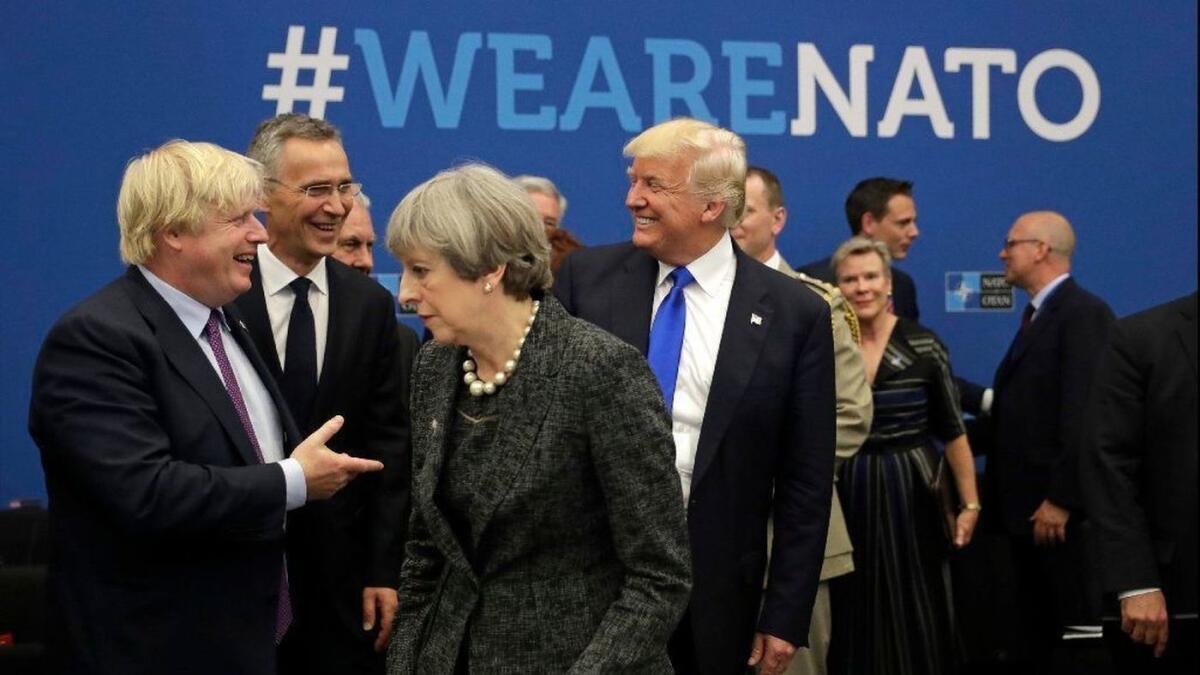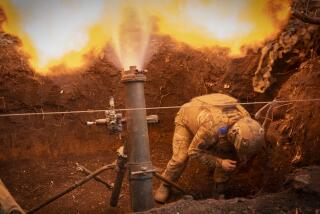Here’s what you need to know about Trump’s complaints to NATO allies about defense spending

U.S. officials have harangued European allies for decades for failing to spend enough on defense. But President Trump has turned up the attacks as he heads to Wednesday’s summit at NATO headquarters in Brussels, raising fears that he is determined to provoke a crisis over funding of the military alliance created after World War II.
RELATED: Trump opens NATO summit with blast at allies, accuses Germany over ties to Russia »
What’s Trump’s problem with the North Atlantic Treaty Organization?
He has complained in tweets and speeches for years that most European countries and Canada are freeloading on the United States, which he said this month is paying for “90% of NATO,” a gross inaccuracy. He has railed against allies that don’t spend 2% of their gross domestic product on defense, a target established by NATO. At times he has said some allies are delinquent on NATO dues.
U.S. presidents since the end of the Cold War have complained that some NATO members don’t spend enough on defense. But Trump’s critique goes further, seeming to stem from a deeply held distrust of alliances and a belief that America gets little or nothing for its defense commitments in Europe.
Is Trump right about the funding?
His attacks are often inaccurate and imprecise. It’s true that the U.S. pays more to NATO in annual dues. And many NATO members, including Germany, Britain and France, fail to meet alliance spending targets. But even with a nearly $700-billion defense budget, the U.S. share of total military spending by NATO members is around 70%, not 90%, according to NATO statistics. And much of the Pentagon budget is focused far from NATO.
Trump tweeted Tuesday that many NATO countries are “not only short of their current commitment of 2 percent (which is low) but are also delinquent for many years in payments that have not been made. Will they reimburse the U.S.?” No, they won’t. That’s not how NATO funding works.
“Trump tends to misuse facts,” says James M. Goldgeier, a Russia expert at American University and senior fellow at the Council on Foreign Relations. “It’s not true. NATO is not a protection racket.”
How does NATO funding work?
Each member of the 29-nation alliance pays a portion of NATO’s annual base budget, which is about $1.8 billion for 2018.
Dues are apportioned under a cost-sharing formula based on gross national income. This funds alliance operations, including joint training, an airborne early-warning system, and headquarters costs in Brussels and in active military theaters such as Afghanistan. Another $822 million goes to the NATO Security Investment Program for construction projects and other long-term spending.
As the largest member, the U.S. pays the most dues — 22% of the total in 2018, or around $396 million. The smallest alliance member, Montenegro, pays .0270%, or around $486,000.
In addition to dues, each NATO country sets an annual budget for funding its armed forces. In response to U.S. pressure, alliance members pledged in 2014 to raise their defense spending to 2% of their gross domestic products by 2024.
How many have achieved the 2% goal so far?
Only four countries met the target in 2017, according to NATO — the U.S. at 3.57%, Britain at 2.1% percent, Greece at 2.38% and Estonia at 2.1%. This year, Latvia is likely to achieve the 2% target, according to NATO estimates.
Poland, Romania and Lithuania are likely to meet the goal soon. But many of NATO’s biggest countries still fall short. Germany, with the second-biggest economy in the alliance, spends 1.24% of its GDP on its armed forces. France spends 1.81% and Turkey spends 1.68%.
Excluding the U.S., total military spending by NATO members has increased modestly in recent years, from $272 billion in 2014 to an estimated $312 billion this year — or less than half the U.S. defense budget. But only 16 allies are “on track” to meet the 2% target by 2024, according to Kay Bailey Hutchison, the U.S. ambassador to NATO and a Trump appointee.
Doesn’t that mean the U.S. is getting a bad deal from NATO?
Not necessarily. Some NATO experts say the 2% goal is an arbitrary target that obscures other meaningful contributions from some alliance members that fall short.
Seven nations — the Czech Republic, Romania, Montenegro, Albania, Denmark, Croatia and Germany — contributed more troops to NATO’s Afghanistan operations as a percentage of their total force than the U.S. did between 2015 and 2017, according to the Center for Strategic and International Studies, a Washington policy analysis organization.
Canada, Norway, Denmark and six other NATO members contributed a larger portion of their military force to operations against Islamic State than the U.S. did in 2016, the report said.
What will happen in Brussels?
Trump’s focus on the 2% spending goal could destroy NATO unity at the summit, just as his complaints about trade disrupted last month’s G-7 economic summit in Canada.
Critics say Trump has not acknowledged how the U.S. derives significant benefits when NATO countries join U.S.-led military operations abroad, or host U.S. troops, planes and warships at bases on their territory. Nor does he seem to factor in NATO’s original and still relevant mission — deterring an attack by Moscow on America’s allies in Europe.
Trump “keeps harping away at the money spent on NATO,” said Ivo Daalder, former U.S. ambassador to NATO and president of the Chicago Council on Global Affairs. “He just looks at the dollars and not what the money is buying.”
Four Republican senators introduced a nonbinding resolution on Tuesday to encourage NATO allies to boost defense spending, even as they praised NATO’s role in ensuring global security.
“NATO is the foundation for global security, which is why President Trump made bolstering this key alliance one of his top priorities,” said Sen. David Perdue (R-Ga.), a member of the Senate Armed Services Committee.
“The importance of NATO to the national security of the United States cannot be understated,” said Sen. James Lankford (R-Okla.), a member of the Senate Intelligence Committee.
Twitter: @davidcloudLAT
More to Read
Start your day right
Sign up for Essential California for news, features and recommendations from the L.A. Times and beyond in your inbox six days a week.
You may occasionally receive promotional content from the Los Angeles Times.







